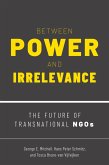Geopolitical shifts, increasing demands for accountability, and growing competition have been driving the need for change within transnational nongovernmental organizations (TNGOs). As the world has changed and TNGOs' ambitions have expanded, the roles of TNGOs have shifted and their work has become more complex. To remain effective, legitimate, and relevant in the future necessitates organizational changes, but many TNGOs have been slow to adapt. As a result, the sector's rhetoric of sustainable impact and social transformation has far outpaced the reality of TNGOs' more limited abilities to deliver on their promises.
Between Power and Irrelevance openly explores why this gap between rhetoric and reality exists and what TNGOs can do individually and collectively to close it. George E. Mitchell, Hans Peter Schmitz, and Tosca Bruno-van Vijfeijken argue that TNGOs need to change the fundamental conditions under which they operate by bringing their own "forms and norms" into better alignment with their ambitions and strategies. This book offers accessible, future-oriented analyses and lessons-learned to assist practitioners and other stakeholders in formulating and implementing organizational changes. Drawing upon a variety of perspectives, including hundreds of interviews with TNGO leaders, firsthand involvement in major organizational change processes in leading TNGOs, and numerous workshops, training institutes, consultancies, and research projects, the book examines how to adapt TNGOs for the future.
Dieser Download kann aus rechtlichen Gründen nur mit Rechnungsadresse in A, B, BG, CY, CZ, D, DK, EW, E, FIN, F, GR, HR, H, IRL, I, LT, L, LR, M, NL, PL, P, R, S, SLO, SK ausgeliefert werden.









